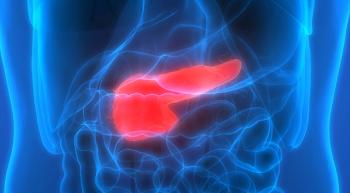
The investigational CAR T-cell product AUTO3 in combination with pembrolizumab was found to have a tolerable safety profile and elicit durable complete responses in patients with relapsed/refractory diffuse large B-cell lymphoma.

The investigational CAR T-cell product AUTO3 in combination with pembrolizumab was found to have a tolerable safety profile and elicit durable complete responses in patients with relapsed/refractory diffuse large B-cell lymphoma.

The new rule outlines procedures for the importation of drugs that were manufactured outside of the United States.

The FDA has granted a fast track designation to DKN-01 for the treatment of patients with gastric and gastroesophageal junction adenocarcinoma whose tumors have high DKK1 expression, who have progressed on or after a fluoropyrimidine- and platinum-containing chemotherapy, and HER2/neu targeted therapy, if appropriate.

The FDA has granted a priority review to a supplemental new drug application (sNDA) for crizotinib (Xalkori) in the treatment of pediatric patients with ALK-positive relapsed/refractory systemic anaplastic large cell lymphoma (ALCL), according to an announcement from Pfizer, Inc.

Findings from the noncomparative, phase 2, biomarker-driven BIONIKK trial demonstrated clinical evidence to support the use of molecularly-directed frontline therapy as means to enrich responses in patients with metastatic clear cell renal cell carcinoma (ccRCC).

The novel VEGFR, FGFR, and CSF-1R inhibitor surufatinib yielded a statistically significant and clinically meaningful progression-free survival (PFS) benefit compared with placebo in patients with advanced pancreatic neuroendocrine tumors (pNETs), according to results from the randomized phase 3 SANET-p trial that were presented virtually during the 2020 ESMO Congress.

Patient education is key in reducing stress, so 1 nurse made a 3D model to help better inform her patients.

Patients with mantle cell lymphoma (MCL) who have high-risk biology, including blastoid variant, a Ki-67 score of at least 30%, or high p53 expression, had a significantly shorter failure-free and overall survival (OS), according to results of a retrospective trial.

The advent of immunotherapy has revolutionized multiple areas of cancer treatment, said Timothy Cragin Wang, MD, who added that the transformative potential of the modality has been mild at best in the field of colorectal cancer (CRC).

Most notably, Ginsburg wrote an opinion on the court case United States v. Virginia, which held that all-male admissions policy at the Virginia Military Institute – which was state funded – was unconstitutional.

Nurses need to know where patients are getting their cannabis products and should look out for a few red flags.

At a virtual event Sept. 17, CURE® also named Elizabeth Farrat, B.S.N., RN, CCRN-K, the winner of its first-ever Finest Hour Award for selfless achievements in care during the COVID-19 pandemic.

Nurses should discuss fertility preservation with all eligible patients and provide them with up-to-date information to make their decision.

Patients should not brush their teeth immediately after vomiting, but there are other steps they can take to protect their teeth.

The FDA approved the CINtec PLUS Cytology test to help determine if HPV-positive women need further diagnostic procedures to prevent cervical cancer.

It is crucial that oncology nurses have open lines of communications with their patients when it comes to adverse events.

The FDA has granted a breakthrough therapy designation to magrolimab for the treatment of patients with newly diagnosed myelodysplastic syndrome (MDS), according to an announcement from Gilead Sciences, Inc.

The FDA granted a fast track designation to the highly-selective N-terminal domain inhibitor EPI-7386 for the treatment of adult patients with metastatic castration-resistant prostate cancer (mCRPC) who are resistant to standard-of-care options, according to an announcement from ESSA Pharma Inc.

As the impact of the coronavirus disease 2019 (COVID-19) pandemic lingers into the later part of 2020, consideration is needed regarding the lasting effects on patients with cancer who may have experienced delayed care or diagnosis.

Nurses play a key role in ensuring that patients with gynecologic cancer understand the results and implications of genetic testing.

Chemotherapy agents are excreted through urine and feces, and a recent study found that both patient and staff bathrooms were contaminated.

The FDA has granted a breakthrough therapy designation to plinabulin for chemotherapy-induced neutropenia (CIN).

While EMRs have improved clinician workflow in recent years, they are not perfect. Paper charts may still have a place in cancer clinical research.

The FDA has approved copper Cu 64 dotatate injection (Detectnet) for the localization of somatostatin receptor–positive neuroendocrine tumors (NETs), according to an announcement from RadioMedix Inc. and Curium Pharma.

Oncology nurses often face incivility from their peers, but there are methods they can use to combat the stress of a toxic work environment.

There is currently no way to measure chemotherapy-induced peripheral neuropathy in pediatric patients, but a team of nurse researchers are developing a new tool to meet this need.

As nurses navigate cancer care during the COVID-19 pandemic, it is especially important that they have their voices heard – and their votes counted.

The FDA has issued an alert to professionals, investigators, and patients that the phase 3 IMpassion131 trial (NCT03125902) failed to show the effectiveness of atezolizumab (Tecentriq) plus paclitaxel in treatment-naïve patients with inoperable locally advanced or metastatic triple-negative breast cancer.

Frontline workers need self care now more than ever.

The novel coronavirus disease (COVID-19) continues to impact the care of patients with metastatic renal cell carcinoma (mRCC) and other cancers in a multitude of ways, according to Toni K. Choueiri, MD, but those working in the field of oncology are rising up to the challenge by learning as much as possible about the virus to make the best treatment decisions possible for their patients.